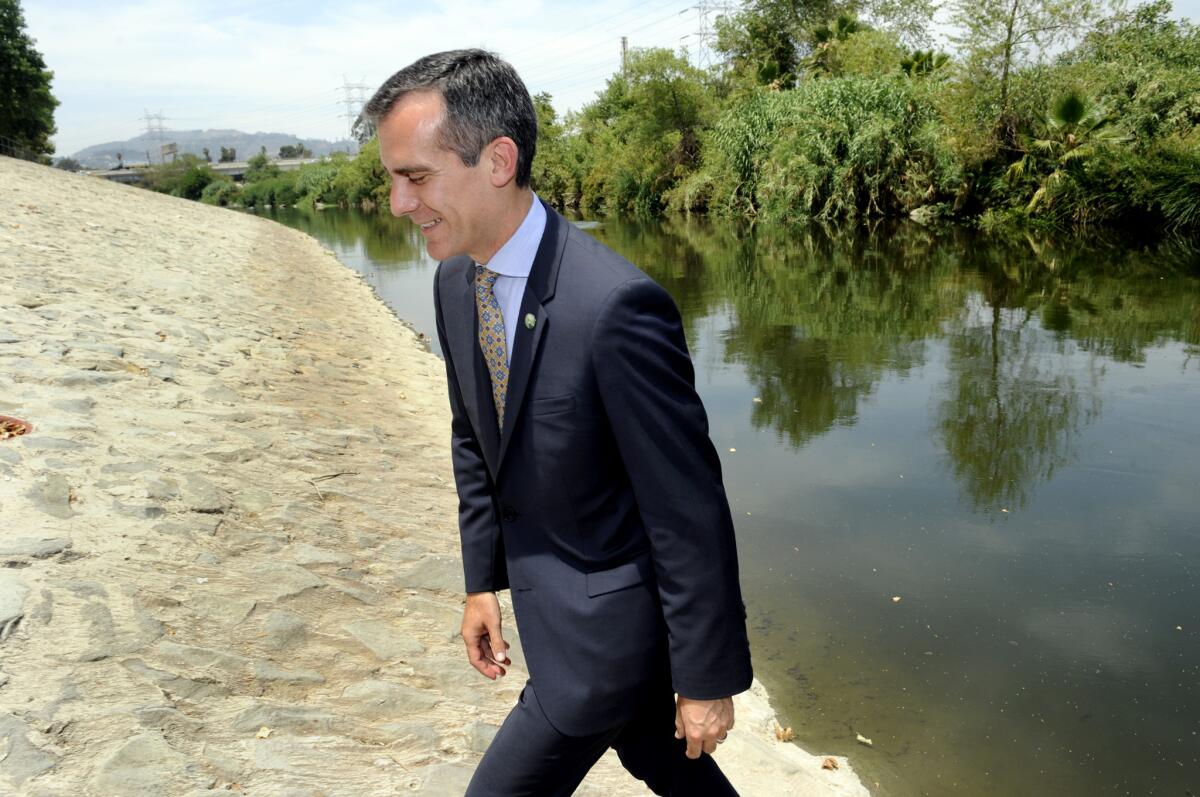L.A. could wind up covering much of $1.3-billion river project cost

- Share via
Last year, Mayor Eric Garcetti announced what sounded like a breakthrough on the Los Angeles River, saying the federal government was backing a $1-billion restoration project — and looking at sharing the costs equally.
Ten months later, city budget analysts say the effort to remake an 11-mile stretch of riverfront has a considerably higher price tag: around $1.36 billion. And the Army Corps of Engineers, which would oversee any effort to remake the river, is signaling the city could be asked to shoulder a much greater portion.
In a report released last week, Chief Legislative Analyst Sharon Tso said the Corps of Engineers is looking at making the city responsible for $965 million, or least 71% of the cost of the river restoration. A second option being weighed by federal officials would put the city’s share at nearly $1.2 billion, or 87% of the financial obligation, said Tso, who advises the City Council.
Tso cautioned the figures are “constantly evolving.” Federal officials have declined to release any numbers, saying they will produce a formal report later this year. But others at City Hall have begun acknowledging the challenges involved in paying for the river initiative, which is expected to take 30 to 50 years to complete.
“We are going to have a heavy lift, in terms of funding this project,” said Assistant City Administrative Officer Patricia J. Huber, appearing this week before a council committee.
The council is scheduled to vote Wednesday on whether to send the federal government a document stating that it is financially capable of pursuing the project. As part of that document, budget officials prepared a menu of possible funding sources for the restoration, including anti-pollution grants, state water bond revenue and soil cleanup funds.
Garcetti spokeswoman Vicki Curry acknowledged the project’s price tag has been adjusted upward over the last few months.
But she said there will still be plenty of time for the mayor to seek a more favorable financial arrangement from the federal government.
“There are many opportunities for the city to negotiate the cost share as the river restoration project moves forward, especially when the project goes to Congress for appropriation,” she said.
Curry said federal officials previously recommended an approximate 50-50 cost share for the river project, albeit with certain conditions. One of those conditions is a limit on the amount of federal funds that can be provided to the city to cover land acquisition.
“Real estate in L.A. is extremely expensive, and a project done in a highly urbanized area makes this more expensive than any other restoration project in the country,” said Jay Field, spokesman for the L.A. office of the Corps of Engineers.
The federal agency also has increased its estimate for the cost of relocating rail yards on a stretch of river that passes downtown, city officials say.
In recent months, the increases have become a topic of concern for budget officials and some council members. A committee headed by Councilman Mitch O’Farrell has been examining the city’s ability to secure outside funding for the project. One document prepared for the council raises the possibility of a $1-billion citywide bond measure—a property tax hike that would require two-thirds voter approval.
O’Farrell, whose district includes a stretch of the river, said he is still hoping that negotiations between the city and the federal government will produce a cost-sharing formula closer to 50-50.
He also said he does not want to put new financial pressures on the city’s finances.
“We’re still looking at a budget deficit” in the coming year, he said.
Lewis MacAdams, president and founder of the nonprofit Friends of the Los Angeles River, said previous estimates for the project’s cost were only preliminary. He did not voice alarm at the changing numbers, saying the project was always contemplated as one that would take decades to complete.
“The only way it’s going to be paid for, as far as I can see, is over a long period of time,” he said.
Follow @DavidZahniser for what’s happening at Los Angeles City Hall
More to Read
Sign up for Essential California
The most important California stories and recommendations in your inbox every morning.
You may occasionally receive promotional content from the Los Angeles Times.














